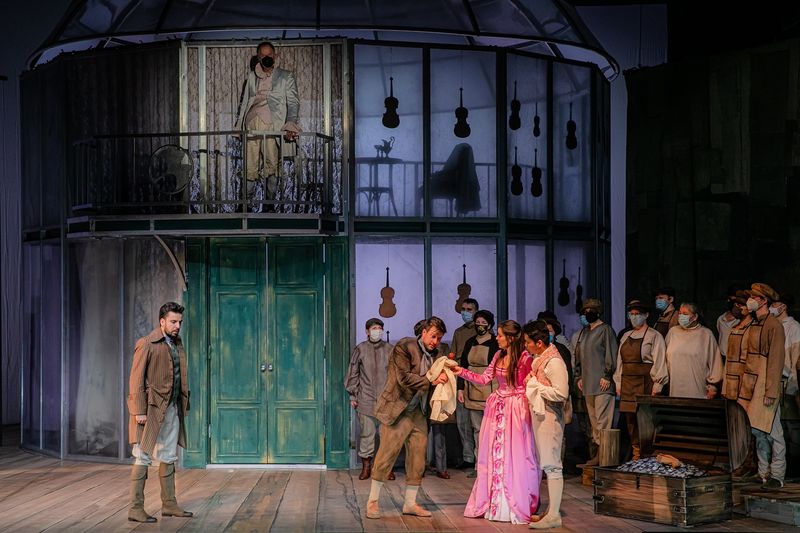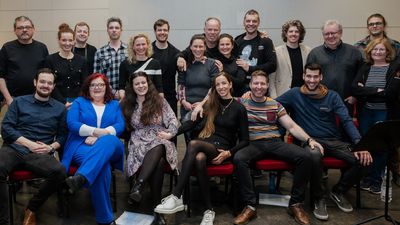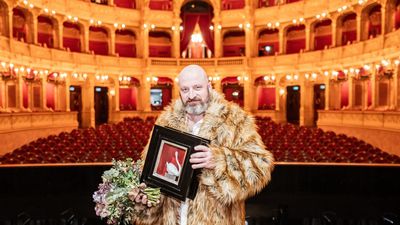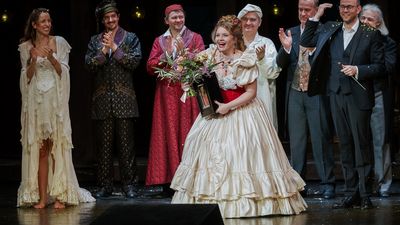
The Hungarian State Opera regards it as a mission to revive works at the Eiffel Art Studios by composers who lived before World War II. In the new paid stream service of the Opera, a double bill featuring Tante Simona by Ernst von Dohnányi and Le luthier de Crémone by Jenő Hubay can be viewed from 7:00 p.m. (CET) on 30 January 2021. The new production directed by Bence Varga is conducted by Oliver von Dohnányi.
Ernst von (Ernő) Dohnányi is one of those Hungarian composers whose works are played much less frequently than they deserve to be. The comic opera Tante Simona (Aunt Simona) takes place in Italy and follows the story of the aunt, who was abandoned by her sweetheart long ago and, with her bitterness undiminished by the intervening years and now intent on protecting her niece, Beatrice, from the disappointments of love, attempts to shut out any and all men from her life – naturally, without success.
Despite the Italian setting, viewers are justified in perhaps feeling that it is a German work they are watching: instead of the unbridled mirth of Italian comic opera, this work exhibits the more restrained good cheer of a singspiel, with von Dohnányi clearly paying his respects to Wagner and Richard Strauss with the richly composed music. The opera premiered in Dresden in 1913, yet it took the Hungarian State Opera until 1933 to present this work, and now, after nearly 90 years, it is returning to the stage here. The title role is performed by Lúcia Megyesi Schwartz, her partners on stage are Adrienn Miksch (Beatrice), Orsolya Sáfár (Giacinta), Botond Ódor (Count Ghino), Antal Cseh (Count Florio) and Bence Pataki (Nuto, a housekeeper).
The city of Cremona announces a competition to see who can craft a violin finer than any other. The stakes are high: aside from a golden necklace, the winner will also gain the hand in marriage of the beautiful daughter of the master craftsman Ferrari. This is the plot of Le luthier de Crémone (The Violin Maker of Crémone). Jenő Hubay was a major figure not only as a composer, but also as a violinist and as a teacher of the instrument. Dubbed the "Hungarian Paganini", he was invited to perform in the concert halls of Paris from an early age. It was presumably during the years he spent in France that he selected François Coppée’s play of the same title, one of the most popular comedies of its era, as the subject of his opera. The catchy music – light and tuneful – and the famous slightly gloomy but heartfelt violin part remind one of both French elegance and operetta.
The piece takes viewers into an appealing world in which a love triangle is resolved through human decency and self-sacrifice. Premiered in Budapest in 1894, it is Hubay’s most popular opera. On special occasions, the composer himself would play its remarkable violin solo. The work received great acclaim both in Hungary and abroad, with runs in Germany, Switzerland, Austria and even New York. Since being made into a television drama in 1987, it has not been performed for more than 30 years. The new production features soloists Sándor Köpeczi (Master Ferrari), Orsolya Sáfár (Giannina), Ninh Duc Hoang Long (Sandro), Csaba Sándor (Filippo) and András Palerdi (The Mayor).
Both operas are staged by young director Bence Varga, who already proved himself with the critically acclaimed productions of Hin und Zurück and Sancta Susanna by Hindemith, in 2018. His creative team includes set designer Anna Fekete, costume designer Nikolett Schütz. The operas are presented with a new Hungarian text by Attila Galambos. (English subtitles are available). The Hungarian State Opera Orchestra and Chorus (chorus master: Gábor Csiki) is conducted by renowned international guest conductor, a member of the Dohnányi dynasty, Oliver von Dohnányi.
Rehearsal photo by Attila Nagy


